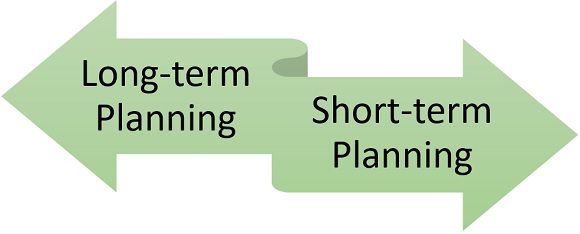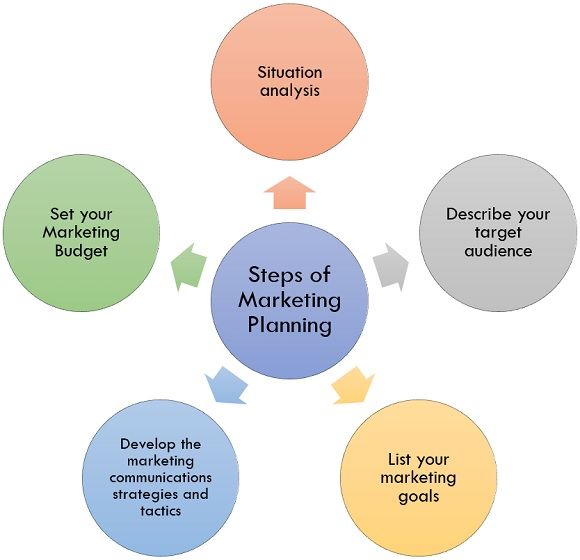Definition: Marketing Planning provides the framework of the advertising and marketing efforts made for the business. It describes the role and responsibilities of a marketing manager to accomplish the objectives of the company. It gives prominence to the distribution of marketing resources pleasantly and economically and provides a creative direction for marketing operations.
Marketing planning consists of the policies, programs, budgets, marketing mix, historical data, current market position and future predictions of the business. However, a good marketing plan also requires a solid marketing strategy as without a proper marketing strategy marketing plan cannot become useful for the business.
Content: Marketing Planning
- Types of Marketing Planning
- Steps of Marketing Planning
- Importance of Marketing Planning
- Benefits of Marketing Planning
- Components of Marketing Planning
- Conclusion
Types of Marketing Planning
Following are the types of marketing planning:

1. Long -Term Marketing Planning
The planning made to achieve the long-term goals of an organization is known as long-term marketing planning. It involves deep research of the market conditions and thus handled by the top-level management of the organization. It is based on the precise strategies set up by the entrepreneurs, considering all the future possibilities and risk factors.
2. Short –Term Marketing Planning
Such planning is done for a short period of time, i.e., for less than one year, for meeting the recurring problems of the business and does not require high-level efficiency. Thus, it is made by the middle-level management of the organization.
Steps of Marketing Planning
Following are the steps involved in marketing planning:

Step 1
Situation Analysis: This section defines your company and its products or services, such as market summary, competition, product offering, SWOT analysis, and keys to success and critical issues.
Step 2
Describe your Target Audience: Develop a simple profile of your prospective customers like influencers they follow, websites they visited, e-mails they opened, blogs and articles they have read, products they have bought, the content they have downloaded, venues they have checked into and searches they have conducted. You can describe prospects in terms of demo graphs of age, sex, family components. It will help in media and public campaigns.

Step 3
List your Marketing Goals: Make a shortlist of What marketing strategies are to be followed? What do you want your marketing plan to achieve? And keep checking what you have achieved and What you have to achieve?

Step 4
Develop the Marketing Communications Strategies and Tactics: It’s time to detail the tactics you will use to accomplish your goals. Outline your primary marketing strategies, then include a variety of tactics you will use, such as specific, measurable, achievable, realistic and timely tactics.
Strategic V/s Tactical Marketing
| Basis of difference | Strategic | Tactical |
|---|---|---|
| Time frame | Long-term | Short-term |
| Focus | Broad | Narrow |
| Key tasks | Defining market and competitive | Day- to- day marketing activity |
| Information and problem solving | Unstructured, external, and speculative | Structured, internal and repetitive |
Step 5
Set your Marketing Budget: Setting your marketing budget is inexpensive and gives high returns. Marketing is essential to the success of your business. Thus, you need to develop a percentage of projected gross sales to your annual marketing budget.
Importance of Marketing Planning
Marketing Planning is an organized and analytical exercise to develop marketing strategies. It may have a connection with the company as a whole or to strategic business units (SBU). It is a progressive exercise that describes the future strategies of a company with special reference to its product expansion, channel design, sales promotion and experience. We can now outline the significance of marketing planning in the following points:
- It helps in avoiding future uncertainties.
- It helps in obtaining governance by objectives.
- It helps in obtaining targets.
- It helps in managing the arrangement and connections among various departments.
- It helps in controlling the activities of the organization.
- It helps consumers in obtaining satisfaction.
Benefits of Marketing Planning
It has the following benefits:
- It encourages successful marketing actions.
- Marketing planning helps to harmonize activities that can expedite the achievement of targets over time.
- It obliges management to evaluate the future in an organized way.
- Resources can be more equitable, respecting identified market events.
- Planning gives a framework for an ongoing check to operations. It will allow the company to provide more attention to market expansion instead of market maintenance.
- It helps to examine performance, take advantage of strength, minimize weakness and risks and lastly, open up new opportunities.
- Marketing planning can be recommended to minimize the threats of failure.
- It decreases the conflicting results of unfavourable circumstances above the control of the management.
- Marketing planning benefits an extensive view of the company and acts as a process of communication and co-ordination amidst the marketing department and other departments.
- Greater alertness to make a change can be stimulated. Marketing strategy is equal to the marketing sense by which the business unit wishes to attain its marketing objectives.
Components of Marketing Planning
It has the following Components:
- The success of marketing planning depends on individual behaviour and response.
- It is complex in nature as it includes the past, present and future predictions of the company.
- Marketing resolutions have long term holdings on efficiency, profitability and market position of a company.
- It is an explicit and organized approach towards the planning of all marketing actions such as price setting, product positioning, distribution channels etc.
- Marketing planning as an analytical action need thinking, imagination and foresight. Market projection, market analysis, consumer behaviour analysis, direct marketing outcomes are based on data and measurement drawn from internal and external environments.
- It is a progressive and changing process design to develop market-oriented or customer-oriented business activities.
- Marketing planning is concerned with two things, first is, refraining from incorrect activities, and second is, diminishing frequency of failure to achievement. Hence, it has both an expectant and a fatalistic component.
- The marketing department of the company handles all the marketing planning on the basis of the proposals given by the distinct divisions of their department; considering all suggestions; marketing plans are developed.
- It is a procedure of determining in advance what to do and how to do it. If the marketing executive wishes to attain a target market at a near-future date and if he wants some time to determine what to do and how to do it, he must create the relevant marketing decisions earlier than taking actions.
- Marketing planning is often a decision-making procedure. It is a program of marketing- based activities concerning the future with the object of underrate risk and ambiguity and producing a set of interconnecting decisions.
Conclusion
Marketing planning is the organized method of evaluating marketing opportunities and resources, deciding marketing goals, describing marketing strategies and implementing guidelines for application and control of the marketing plan. The marketing planning cycle is a circular procedure, with assessment used to relate and synchronize all steps of the planning cycle.
Dianne Miller says
I like that you talk about the advantages of a marketing plan in business. It consists of the policies, programs, budgets, marketing mix, historical data, current market position, and future predictions of the company. However, a good marketing plan also requires a solid marketing strategy, as without a proper marketing strategy marketing plan cannot become beneficial for the business. It is a progressive and changing process design to develop market-oriented or customer-oriented business activities. With all these tips and followed by small business owners possibilities of success is high.